
Boa is a genus of non-venomous boas found in Mexico, the Caribbean, and Central and South America. Five species are currently recognized.

The Anomochilidae, or anomochilids, are a monotypic family of snakes, created for the genus Anomochilus, which currently contains three species. It is commonly called dwarf pipe snake.

Aspidites is a genus of pythons endemic to Australia. The name can be translated as "shield bearer" and pertains to the symmetrically shaped head scales. Currently, two species are recognized.

The Leptotyphlopidae are a family of snakes found in North America, South America, Africa and Asia. All are fossorial and adapted to burrowing, feeding on ants and termites. Two subfamilies are recognized.

The Aniliidae are a monotypic family created for the monotypic genus Anilius that contains the single species A. scytale. Common names include American pipe snake and false coral snake. It is found in South America. This snake possesses a vestigial pelvic girdle that is visible as a pair of cloacal spurs. It is ovoviviparous. It is non-venomous, and its diet consists mainly of amphibians and other reptiles. Currently, two subspecies are recognized, including the typical form described here.
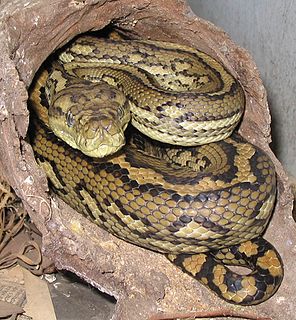
Morelia spilota, commonly referred to as the carpet python, is a large snake of the family Pythonidae found in Australia, New Guinea, Bismarck Archipelago, and the northern Solomon Islands. Many subspecies are described; ITIS lists six, the Reptile Database six, and the IUCN eight.
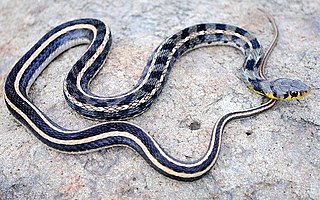
The buff striped keelback is a species of nonvenomous colubrid snake found across Asia. It is the sole species of genus Amphiesma. It is a typically nonaggressive snake that feeds on frogs and toads. It belongs to the subfamily Natricinae, and is closely related to water snakes and grass snakes. It resembles an Asian version of the American garter snake. It is quite a common snake but is rarely seen.

The brahminy river turtle or crowned river turtle is a species of turtle in the family Geoemydidae. The species is endemic to South Asia.

The mud adder, also known as De Vis' banded snake, is a species of venomous snake in the family Elapidae. The species is endemic to certain regions of eastern Australia, including South West Queensland, northern New South Wales and north-west Victoria. Its scientific and common names refer to Charles Walter De Vis (1829-1915), first director of the Queensland Museum and writer of around 50 papers on herpetology.
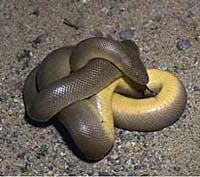
Charina is a genus of nonvenomous boas, commonly known as rubber boas, found in North America. Three species are currently recognized.

Apodora papuana is a species of python, commonly known as the Papuan python, Irian python or Papuan olive python. It is found in New Guinea. It is the only species in the genus Apodora. No subspecies are currently recognized.

Pseudechis is a genus of venomous snakes in the family Elapidae. It contains the group of elapid species commonly referred to as the black snakes. Species of Pseudechis are found in every Australian state with the exception of Tasmania, and some species are found in Papua New Guinea. They inhabit a variety of habitat types, from arid areas to swampland. All species are dangerous and can inflict a potentially lethal bite. Most snakes in this genus reach about 2 m (6.6 ft) in total length, and vary in colour. Some species are brown, whereas others are black. The most recognisable and widespread species in the genus are the red-bellied black snake and the mulga snake. These snakes feed on lizards, frogs, birds, small mammals, and even other snakes. All species of Pseudechis lay eggs with the exception of the red-bellied black snake P. porphyriacus which is viviparous. The genus Pailsus is a synonym of Pseudechis, and more work is needed to understand species limits among the smaller species of the group.

The amethystine python, also known as the scrub python or sanca permata locally, is a species of non-venomous snake in the family Pythonidae. The species is found in Indonesia, Papua New Guinea, and Australia. Popular among reptile enthusiasts, and noted for its coloration and size, it is one of the six largest snakes in the world, as measured either by length or weight, and is the largest native snake in Australia and Papua New Guinea.

Hydrophis is a genus of sea snakes, venomous snakes in the subfamily Hydrophiinae of the family Elapidae. Species in the genus Hydrophis are typically found in Indo-Australian and Southeast Asian waters. Currently, around 36 species are recognized as being valid.
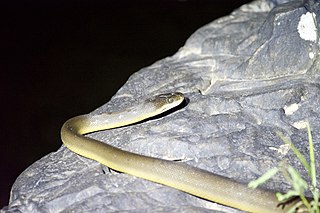
The water python is a nonvenomous python species found in Australia and Papua New Guinea. No subspecies are currently recognized.
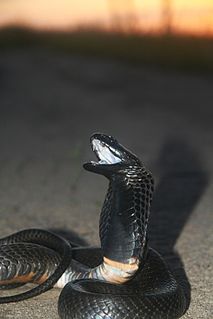
The black-necked spitting cobra is a species of spitting cobra found mostly in sub-Saharan Africa. They are moderately sized snakes that can grow to a length of 1.2 to 2.2 m in length. Their coloration and markings can vary considerably. They prey primarily on small rodents. They possess medically significant venom, although the mortality rate for untreated bites on humans is relatively low. Like other spitting cobras, they can eject venom from their fangs when threatened. The neurotoxic venom irritates the skin, causing blisters and inflammation, and can cause permanent blindness if the venom makes contact with the eyes and is not washed off.

The prong-snouted blind snake is a species of non-venomous worm-like burrowing snakes belonging to the Typhlopidae family. It is endemic to central southern, continental Australia.
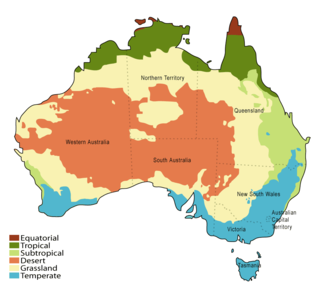
Australia’s landmass is 7,617,930 square kilometres. Due to the country's large landmass, many climates are experienced including equatorial, tropical, subtropical, desert, monsoonal, temperate, and alpine. These differing climates influence Australia's snake distribution and abundance, and provide many different and unique habitats for them.

Pararhadinaea is a monotypic genus of snakes in the subfamily Pseudoxyrhophiinae. The only species is Pararhadinaea melanogaster, sometimes known as the Madagascar burrowing snake. It is endemic to the island of Madagascar.
Amnesteophis is a genus of snakes in the family Colubridae that contains the sole species Amnesteophis melanauchen. It is found in Brazil.


















